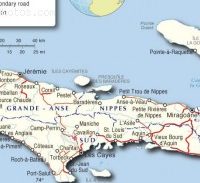Abricots

Abricots is a beautiful place located in the Jérémie Arrondissement in Haiti’s Grand’Anse Department. The town is surrounded by a vast coastal area. All the year through, the climatic conditions are nice and pleasant. Hence the main activity carried out is fishing.
Formerly, Abricots was called “Indian Paradise”. The name is inherited from a legend spread by the first Spanish chroniclers. The Indians would have placed there their paradise where after death they would eat delicious apricots (mameys). Abricots was raised to the rank of commune in 1789. In terms of cultural heritage, the commune has lots of sites that are only remnants of some colonial buildings or settlements.
Demographics: The inhabitants of this commune are called Abricotins. People living here are nice and beautiful. In 1998, the population of the Abricot commune was 34,329 inhabitants, the vast majority of which were 96% living in rural areas. The 2015 population stands at 32,000 inhabitants.
Abricots is coastal and the climate is normal. The dominant terrain of the Abricots town is the plain, while the communal sections are dominated by the hills.
The main attraction of Abricots is the exotic beaches where lots of people visit to spend quality time in exploring the beautiful surroundings. Some of the best Haitian cooks prepare seafood with distinguished taste in Abricots. Exclusive seasoning and natural herbs are used for preparing fresh seafood harvested from the sea, the same day. Sugarcane, cacao and coffee are the other crops grown here.
The area of Abricots runs into a 41 square mile area. From Jérémie, it is located at a distance of seven miles.
Education: The Ministry of the National Education of Youth and Sports is represented in the commune of Abricots, by an office of the School Department. There are around 25 schools as per estimates of 2004 in Abricots. Students can get education right up to the high school level as provided by the educational system in Abricots. Youth and children are able to get primary and secondary education in the town.
In the region there is one school providing technical education. No schools are available to gain education at the university level. If any student is keen on getting university or even college education, then the student has to travel to Port-au-Prince or Jérémie.
Healthcare: The ministry of Public Health has no representatives at the level of the commune. Limited healthcare facilities e available for the people living in Abricots. A clinic and a maternity hospital have been listed in the commune. The medical staff consists of 2 qualified physicians, one nurse, one auxillary, and seven certified matrons. Even if the medical facilities are limited to few, there are at least a dozen healthcare professionals who assure the best care for people in Abricots.
Utilities: For water availability, the town has two rivers, 40 springs and a lagoon. It is worth mentioning that there are four fountains and a public shower. Similarly, the first section Anse-du-Clerc has three fountains and a public shower.
For electricity and communication, the city and the first communal section Anse-du-Clerc are electrified by an electric motor. The management of electrical energy is made by a committee consisting of nine and ten persons respectively for the city and the 1st section of Anse-du-Clerc.
Religion: On the side of religion, people in Abricots are very spiritual. The population is served by twenty churches of various denominations: thirteen Catholic temples (chapels included), seven Baptist churches, four Adventist churches, four churches of God and one Wesleyan Church were listed.
Local mambos and houngans provide consultation for various healthcare and spiritual needs.
Leisure: As for leisure, the commune of Abricots does not have a library, a museum, a theatre room or a cinema. The only sport played is football (soccer).
Communication: There is no telephone, no radio station, no television station, no newspaper/magazine in the commune. The postal office exists with a single factor for the whole municipality.

